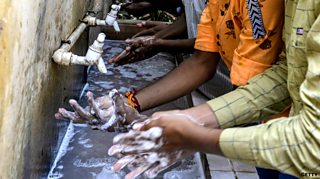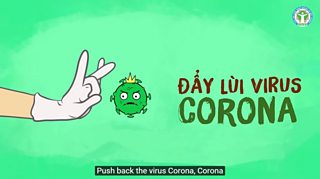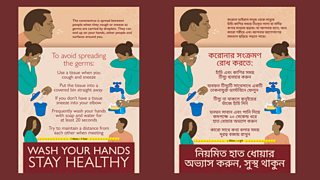The COVID-19 ‘info-demic’: A view from Bangladesh
Rumours, mis- and dis-information about COVID-19 are spreading rapidly around the world and can be almost as harmful as the virus itself. Hear from our Senior Project Manager in Bangladesh, Kate Gunn, about the latest developments from our new global communications initiative tackling the COVID-19 ‘info-demic’.

Proper hand hygiene is key to the Covid-19 response
From working on BBC Media Action’s response to the Rohingya refugee crisis for the past 18+ months, I’ve seen firsthand how media and communication have the power to save lives.
The same is true in a health crisis. Trusted, accurate and timely information can help communities prevent or reduce the spread of disease, and guide those affected towards services and treatment.
This trusted information is needed now more than ever as countries across the world – including here in Bangladesh – take action against the COVID-19 pandemic and work to save lives.
There is so much misinformation swirling – from how the virus is transmitted, to where it has come from, to false rumours about its prevention and treatment. All of these can endanger people’s lives. I’m leading BBC Media Action’s new project, in partnership with Translators without Borders, Internews and Evidence Aid, to deliver clear, fact-based social media content to counter this ‘info-demic’.
There is a lot of content already being produced by a range of development, health and humanitarian organisations and by government departments to dispel misinformation – and by enthusiastic community-level producers too. Much of this content is really good.
But some of it we describe as “yes, but…” efforts: they might have good concepts, but they contain small issues that dilute the content’s effectiveness or give off mixed messages.
For example, the fantastically catchy Vietnamese song and animated video “Ghen Cô Vy” has become incredibly popular online both in Vietnam and internationally, even sparking a viral TikTok dance challenge. And it generally offers really good advice.

Still from the Vietnam Health Ministry's video "Ghen Co Vy"
The but is when the video demonstrates the idea of community solidarity with a scene in which two people hold hands – an action that could transfer the virus from one hand to another.
So our challenge is not only creating content that applies to our country, our region and globally, but also working to help others do the same.
In Bangladesh, from where we’re managing the project, the situation is changing rapidly. Our main challenge is to keep our public service announcements, video clips and materials (some of which you can see here) up-to-date with official government and World Health Organization advice, and also to meet the fast-evolving concerns and needs of our audiences.

An example of the content we're producing in Bangladesh around hand hygiene and coughing/sneezing etiquette
In Cox’s Bazar, home to vast Rohingya refugee camps, and in other areas of the country where media don’t reach reliably, we usually rely on being able to share our content face-to-face with people – such as in community events and listener groups. We also know that community outreach activities strengthen what goes out on mass media, because we can discuss and interact directly with our audiences.
But, under current circumstances, there is likely to be less opportunity for that. Outreach staff will become more constrained in the level of contact they can have with communities as regulations on social distancing take hold. This is a huge challenge which also puts already vulnerable audiences at risk – imagine living in a rural community right now and facing the spread of COVID-19, with no access to any source of information about what it is or how to protect yourself.
To help address this, we’re already working to make sure that front-line staff in healthcare facilities also have access to our content and receive basic training in how to communicate it, so that communities are still getting access to that vital trusted information.
With the situation developing so quickly, it’s hard to predict what will change tomorrow – let alone next week. But with our team’s experience in humanitarian response communication, and collaboration across our BBC Media Action country offices, we are doing all we can to provide audiences with trusted, accurate and engaging content that can save lives.
--
Kate Gunn is Senior Project Manager in our Bangladesh office.
Our COVID-19 response work is funded by the H2H Network with the support of the UK’s Department for International Development (DFID). For more information, click here.
And if you’re a media professional seeking advice on how best to report during public health emergencies, check out our recent blog with top tips here.
- Log in to post comments
